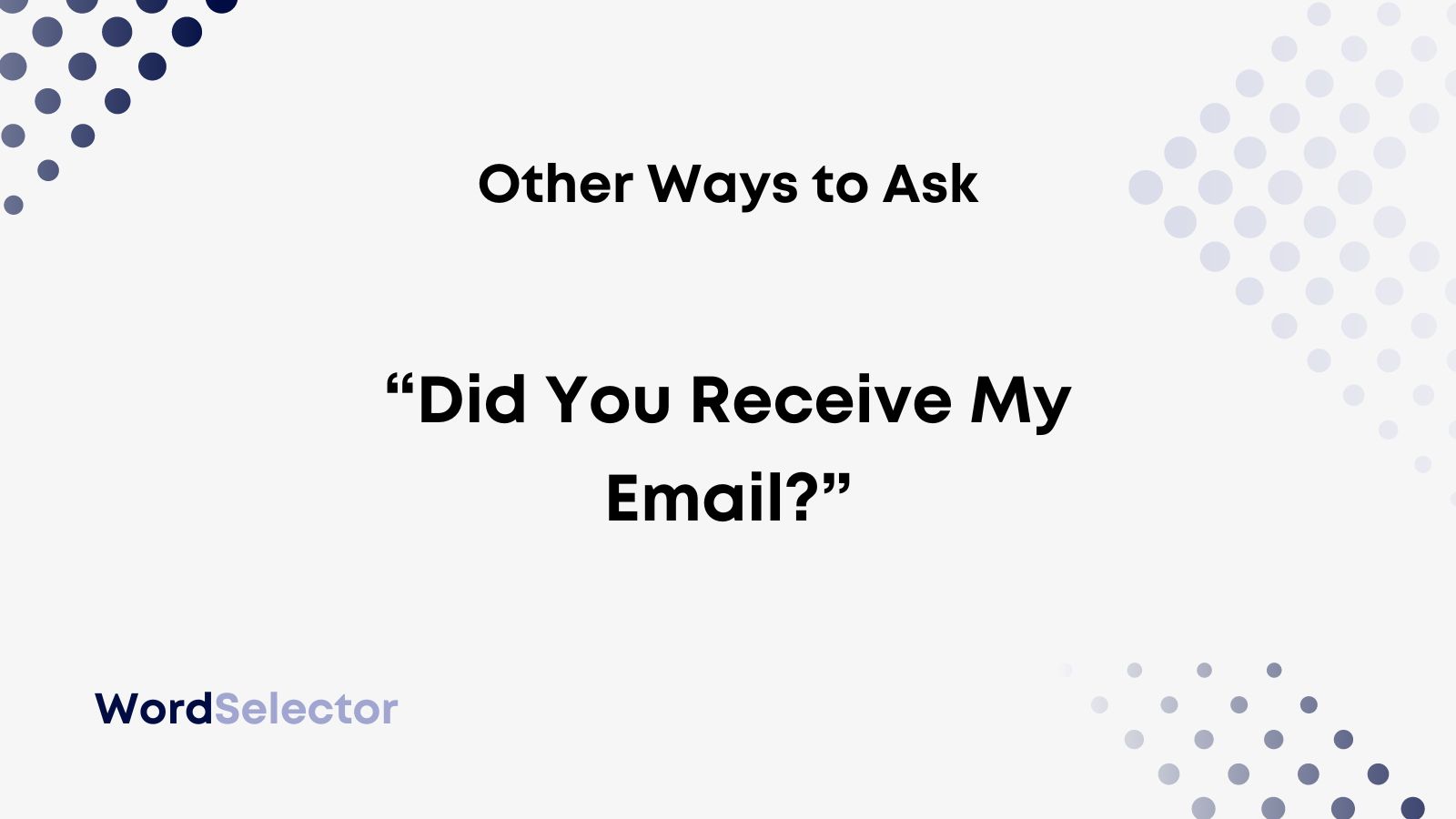If someone hasn’t replied to an important email from you, it’s important to chase them up. That’s why you want to ask “did you receive my email?” However, is this the best question?
This article will explore how to ask if someone received your email politely. We’ll include some great phrases to use as a follow-up.
Other Ways to Ask “Did You Receive My Email?”
- Please respond to my email
- I assume you haven’t seen my email
- Since you have not responded to my email
- When you get a moment, please respond
- I am still waiting on your response to my email
- Could you try and respond
- I just wanted to make sure that you received my email
- I would like to ask if you have received my email
- Have you seen my email?
- I hope you received my email
- You might have received an email
- Did you have the opportunity to see my email?
- Have you had a chance to look at the email below?
KEY TAKEAWAYS
- “Did you receive my email?” is good in formal emails but it’s not always a polite option.
- You could say “please respond to my email” to appear professional and confident in most business contexts.
- “I assume you haven’t seen my email” is a more informal way to suggest someone hasn’t responded to you.
As you can see, there are quite a few alternatives. We’ll touch on the best options for both formal and informal contexts to help you with it.
We’ve also written about whether “did you receive my email?” is correct at the end. If you’d like to learn more about that, you can skip to the final section.
Please Respond to My Email (Formal)
“Please respond to my email” is a great choice to politely remind someone to reply to your email. You can use it in formal emails when trying to get a response on something you sent before.
It’s most common to use this phrase when emailing employees. It reminds them they have an email in their inbox that contains important information. It’s a very confident and commanding phrase that shows you’re in charge and need a reply.
We encourage using “please respond to my email” over “did you receive my email?” in most formal contexts. It’s more confident and direct, letting the recipient know that you expect a reply.
Check out this example to see how it works:
Dear Abigail,
Please respond to my email when you get some time. I am still waiting to know whether you’re on board.
Yours,
Joanna
I Assume You Haven’t Seen My Email (Informal)
“I assume you haven’t seen my email” is a more informal alternative to “did you receive my email?” After all, it is a conversational statement that shows someone hasn’t replied to you.
However, it is not as demanding or questioning as “did you receive my email?”
It works when speaking to colleagues you might have emailed earlier in the week. It shows that it’s not important that they haven’t replied, but you would still appreciate an update.
Generally, you wouldn’t use “I assume you haven’t seen my email” in business contexts. In these cases, you should stick to “did you receive my email?” to show more confidence and professionalism.
So, here is an example to show you how it works informally:
Hi Elspeth,
I assume you haven’t seen my email yet! It’s not a problem, but I could really do with a response!
Best wishes,
Sam
Is It Correct to Say “Did You Receive My Email?”
“Did you receive my email?” is grammatically correct and formally acceptable. You can use it to ask someone if they’ve taken the time to read your previous email.
However, it’s not polite in most situations. Instead, it’s a question that assumes someone hasn’t responded to you because they didn’t think it was necessary to do so. It can be quite rude in some contexts.
For example, if you’re emailing an employee, you might use this question. It suggests they’ve overlooked an email you sent them, and you’re not happy about it. Though, you should only use it in business situations if you’re someone’s boss and don’t mind telling them off.
These variations also follow the same demanding idea:
- Did you receive the documents?
- Did you get my email?
- Have you received my email?
You can generally use “did you receive” or “have you received” in different cases.
“Did you receive” is the past tense. It suggests you’ve already sent the email and expected a response beforehand.
“Have you received” is the present perfect tense. It suggests you’ve sent the email, but you don’t mind waiting longer for a response as it was fairly recent.
You should bookmark this page if you’re still struggling with the phrase! That way, you always have something to refer to when you need more guidance.

